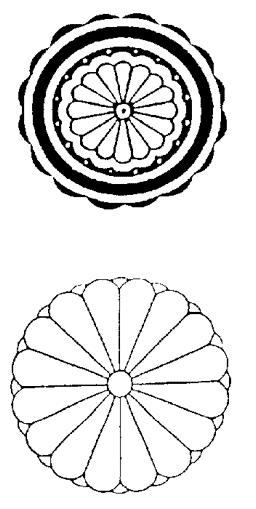 |
Science Frontiers ONLINE No. 87: May-Jun 1993 |
|
|
The Zuni Enigma
 The Zuni sacred rosette (top) closely resembles Japan's national symbol, a stylized chrysanthemum (bottom) |
"...evidence suggesting Asian admixture is found in Zuni biology, lexicon, religion, social organization, and oral traditions of migration. Possible cultural and language links of Zuni to California, the social disruption at the end of the Heian period of the 12th century in Japan, the size of Japanese ships at the time of proposed migration, the cluster of significant changes in the late 13th century in Zuni, all lend further credibility to a relatively late prehistoric contact."
We cannot delve into all classes of evidence adduced by Davis. Let us focus on the Zuni biological anomalies:
Skeletal remains. These show a significant change in Zuni physical characteristics from 1250-1400 AD, suggesting the arrival of a new element in the Zuni population.
Dentition. Three tooth features of the Zunis lie midway between those of Asians and other Native Americans; namely, shoveling, Carabelli's cusp, and 5-cusp pattern on the lower second molar.
Blood-group characteristics. Blood Type B is frequent in East Asian populations but nearly absent in most Native Americans. Zuni, on the other hand, have a high incidence of Type-B blood.
The "Zuni disease". The kidney disease mesangiopathic glomerulonephritis is much more common among the Zuni than other Americans, and it is also very common in the Orient.
(Davis; Nancy Yaw; "The Zuni Enigma," NEARA Journal, 27:39, Summer/Fall 1993. NEARA = New England Antiquities Research Association.